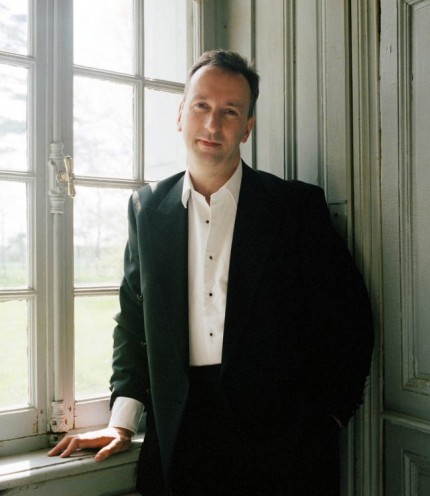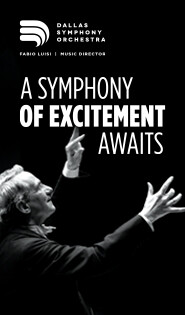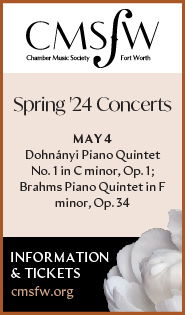Houston Symphony balances the light and dark in Handel’s “Messiah”

Paul Agnew conducted the Houston Symphony Orchestra and Chorus in Handel’s “Messiah” Friday night at Jones Hall. Photo: Sandrine Expilly
George Frideric Handel knew what he was doing. He performed Messiah around Easter, when following Jesus’s saga to its brutal conclusion suits the occasion. But at Christmastime, when the oratorio mainly turns up nowadays, the violence and suffering invoked in Parts 2 and 3 can weigh heavily on the holiday cheer.
Tenor-turned-conductor Paul Agnew found the right balance Friday with the Houston Symphony Orchestra at Jones Hall. He abridged Messiah’s latter parts a bit, keeping the most dramatic and eloquent numbers. And he led a performance that brought the oratorio’s words to life–especially in the choruses.
The Houston Symphony Chorus sang with a buoyancy and nimbleness that 100-voice groups rarely boast. The basses couldn’t quite articulate a couple of the speediest spots, admittedly. But they never lapsed into the huff-and-puff struggle that generations of basses resorted to. So the celebratory numbers danced along joyfully; the orchestra’s breeziness fit right in.
In the middle of all that, key moments stood out. As “For unto us a Child is born” zipped along, its enthusiastic diction and lively tone put an extra excitement in the words “Wonderful! Counselor!”
The group heightened more dramatic moments the same way. In “Surely, He hath borne our griefs,” a sudden crescendo made the words “our iniquities” like an outcry of guilt. When “All we like sheep have gone astray” split the choir into competing factions, they delivered the words “every one to his own way” in a pounding staccato that exuded stubbornness.
After launching the climactic “Worthy is the Lamb” in grand, sonorous phrases, the chorus switched to a brighter tones and crisp diction as Handel’s music invoked “strength and honor and glory and blessing.”
Among the soloists, tenor Sam Levine and bass Alex Rosen shared the vividness. Levine brought Handel a darker, somewhat heftier voice than many oratorio tenors. So “Comfort ye” reached out in a bigger-hearted way than it usually does, and “Ev’ry valley”–thanks to Levine’s agility–rang out with more excitement. And when Jesus faced his tormentors, the venom Levine put into the phrase “they shoot out their lips” all but painted their picture.
Bass Rosen was most imposing when Handel’s music let him show off the depth and darkness of his voice’s middle and bottom ranges. In “Thus saith the Lord,” he and Agnew relished the grand proclamations.
When the flamboyant “Why do the nations” and “The trumpet shall sound” surged toward the top of Rosen’s voice, it sounded thinner. But in the latter aria, the Baroque tradition of embellishing and varying the vocal line let Rosen aim down toward the resonant region where he was most at home.
Soprano Yulia Van Doren’s bright, vibrant singing made the scene of the angel announcing Jesus’s birth especially vivid. Though Agnew set a tempo for “Rejoice greatly” that sounded driven rather than joyful, Van Doren was mostly able to manage the aria’s acrobatics at his pace. Her silvery tone lent an almost childlike purity to the more lyrical arias, especially “I know that my Redeemer liveth.”
Countertenor Daniel Taylor sang in light, sometimes tentative tones that didn’t project well into the capacious Jones Hall. In the music’s lower range and occasionally at the ends of phrases, he faded into audibility. But in “He gave his back to the smiters,” Taylor did summon some ferocity to conjure up the haters’ “shame and spitting.”
Agnew and the orchestra sometimes took a few moments to get themselves synchronized as musical numbers began. That was especially obvious at the start of “The people that walked in darkness,” where the unison strings weren’t very unified at first.
But once everything was rolling, the orchestra brought clarity and impact to Handel’s score. And in “The trumpet shall sound,” principal trumpet Mark Hughes made the solos a ringing foretaste of Judgment Day.
The Houston Symphony Orchestra and Chorus repeat Messiah at 8 p.m. Saturday and 2:30 p.m. Sunday at Jones Hall. houstonsymphony.org; 713-224-7575


